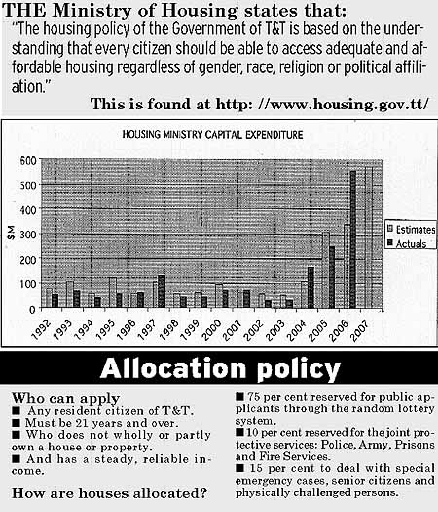Critique of State housing policy
Part 2
Who qualifies?
Published Thursday 9th August, 2007

Last week we suggested how one could rank the people
in our housing market from those who cannot afford any housing, to those
who can afford several.
This week, we begin
by examining the capital expenditure of the Housing Ministry as set out
in the bar chart for the period 1992-2007.
The figures are from
the estimates of expenditure, published by the Ministry of Finance. This
capital expenditure would pay for new homes and the associated
infrastructure such as roads, drains and other services. The chart shows
a dramatic increase in that spending, particularly since 2003.
On this count alone,
there does appear to be a serious commitment of resources to deal with
this national issue. Of the $2.24 billion budgeted for capital
expenditure on housing in period since 1992, about 60 per cent has been
in the last four years; a total of $1.325 billion between 2004 and this
year.
Another way to assess
the ministry’s performance in this area is to compare the estimated
(budgeted) with the actual expenditure over the period. In both 2004 and
2006, the budgeted amounts were exceeded, by 56 per cent and 63 per
cent, respectively.
We have no access to
detailed information on output in either numbers of new homes or unit
costs or costs per sq ft, so it is not possible to comment on those
variances. One would hope that adequate management controls are in place
to reduce the scope for waste of public money.
Given the rate of
expansion in the capital programme and the ambitious targets set in this
arena, it is vital to go further than management controls to ensure that
output details are also made public as suggested above.
We need to look
beyond the vast monies being spent on this public programme to ask:
·
How all these new
homes are being allocated?
·
To whom do the new
homes go?
·
What are the rules?
The ministry’s
allocations policy for the new homes is found at
http://www.housing.gov.tt/Allocation_Policy/Allocation_Policy.htm
and is set out in the sidebar.
It is interesting to
pause and consider the position here.
Proper housing is
important to developing a better society, so much so that vast sums of
taxpayers’ dollars are being spent to build those long-overdue new
homes.
The basis of the
Housing Ministry’s policy, noted at the start of this column, that
“every citizen should be able to access adequate and affordable housing”
does not sit well with its own allocations policy.
From our reading of
that policy, it seems that, once the four basic requirements are
satisfied, one qualifies for housing. Furthermore, it also seems that
there is a random lottery system for allocation of 75 per cent of the
units. Perhaps this was meant to ensure some fairness in the allocation
process.
It seems obvious that
this housing policy is vital to improve the living conditions of our
fellow citizens who are not prosperous enough to afford high-priced,
private homes. Yet it seems that the preference given to promoting home
ownership has spawned a questionable allocation policy, one which gives
priority to those who can afford to buy or rent the new homes built by
the State. Which itself contradicts the fundamental policy objective.
This is a flawed policy which gives you a ticket in the lottery for a
new home, only if you can afford one. But, as the old National Lottery
slogan used to say “if you haven’t got a ticket, you haven’t got a
chance.”
Surely there must
some weight given to need in making an equitable allocation of scarce
public housing. Is there a case for measuring housing need?
It is our view that
that is the only way the core policy objective can be realized. If that
is accepted and adopted, we would also need to recognize and reflect
that those in housing need and those who can afford housing will always
be in tension with each other. Hard choices have to be made if we are
really to progress on these issues.
Some final thoughts.
Is there a place for
larger, poorer households in this programme? Once you satisfy the four
requirements set out in the sidebar, does a single applicant qualify for
the same size and price of home like someone with five children?
Does the allocation
policy assess them all as having equal entitlement? Do you have the same
chance in the housing lottery?
If that is the case,
and there is nothing in the allocation policy to indicate otherwise,
then the housing policy is a vast misallocation of State funds. We are
not here imputing illegality, but there is more to be said on this.
Next week, we will
conclude by examining the issue of alienation of agricultural lands and
the development of equitable policies in this general arena of housing.
Afra Raymond is a
director of Raymond & Pierre Ltd. Feedback can be sent to afra@raymondandpierre.com.
|

